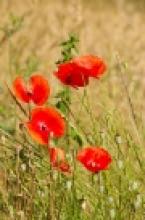Tomorrow is Veteran's
Day in the U.S. and Remembrance Day in much of the former British Empire. When I was a child people wore little red paper poppies in remembrance of the soldiers who served in World War I, especially, as well as later wars. I very much associate this day, and of course the custom of wearing poppies, with the poem "In Flanders Fields" by Canadian ArmyLieutenant Colonel John McCrae, MD.In Flanders fields the poppies blow
Between the crosses, row on row,
That mark our place; and in the sky
The larks, still bravely singing, fly
Scarce heard amid the guns below.We are the dead. Short days ago
We lived, felt dawn, saw sunset glow,
Loved, and were loved, and now we lie
In Flanders fields.Take up our quarrel with the foe:
To you from failing hands we throw
The torch; be yours to hold it high.
If ye break faith with us who die
We shall not sleep, though poppies grow
In Flanders fields.—Lt.-Col. John McCrae (1872 - 1918)
Dr. McCrae left his position at McGill university to serve as a physician on the scene of some of the bloodiest battles in World War I, in Flanders, in southwest Belgium. McCrae served as a surgeon attached to the 1st Field Artillery Brigade. He was dressing the wounded by the Canal de l'Yser, just a few hundred yards north of Ypres when the poem came to him, and he scribbled it down in a notebook.
On the previous day, McCrae had served as Chaplain at the grave site of a former student and friend, Lieutenant Alexis Helmer of Ottawa killed by a shell burst on May 2, 1915. The death was very much still on McCrae's mind as he sat on the back of a parked ambulance in the field dressing area, surrounded by wounded and looking out towards a field peppered with graves, and the bright blooms of poppies, stirred into growth as the spring soil was turned over by grave diggers.
McCrae was not pleased with the poem, and cast it away, but the poem was rescued by fellow officer Francis Alexander Scrimger. Scrimger sent the poem to English newspapers, who published it. The popular humor and political commentary magazine Punch published the poem more formally on the 8th of December, 1915.
It rapidly became associated with Veterans' and Remembrance Day, and that led to the association with poppies for remembering the service of veterans.
You will often seen only the first two stanzas of the poem quoted, since some feel the final stanza is an exhortation to war; I would argue, instead, that it is a reminder that those soldiers who died, and lie beneath green mounds covered with red poppies, died for a reason and a cause, and that they did not die for small, casual things, but for the sake of those they left at home.
McCrae died of pneumonia in 1918, an infliction that was in part associated with his military service.
